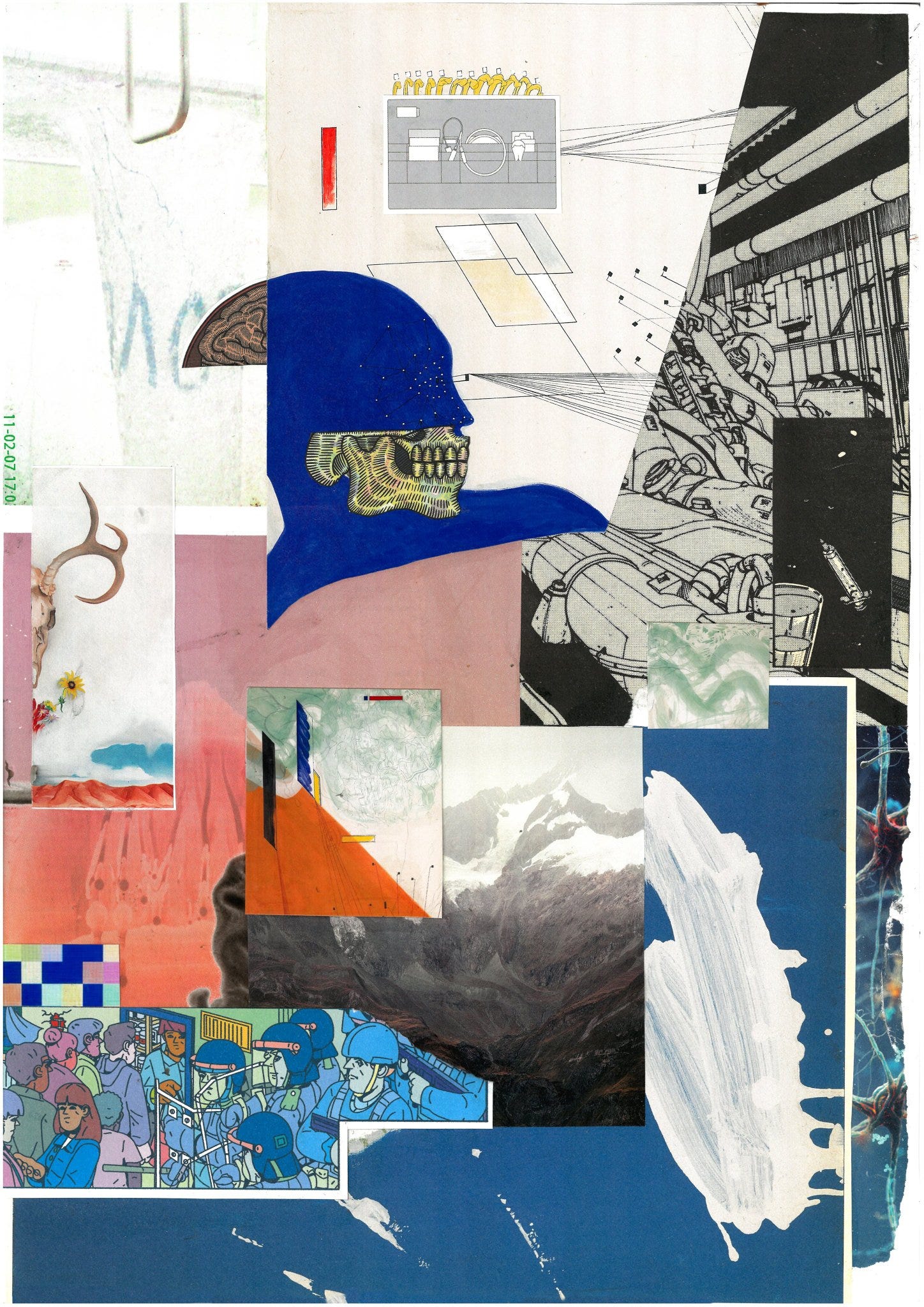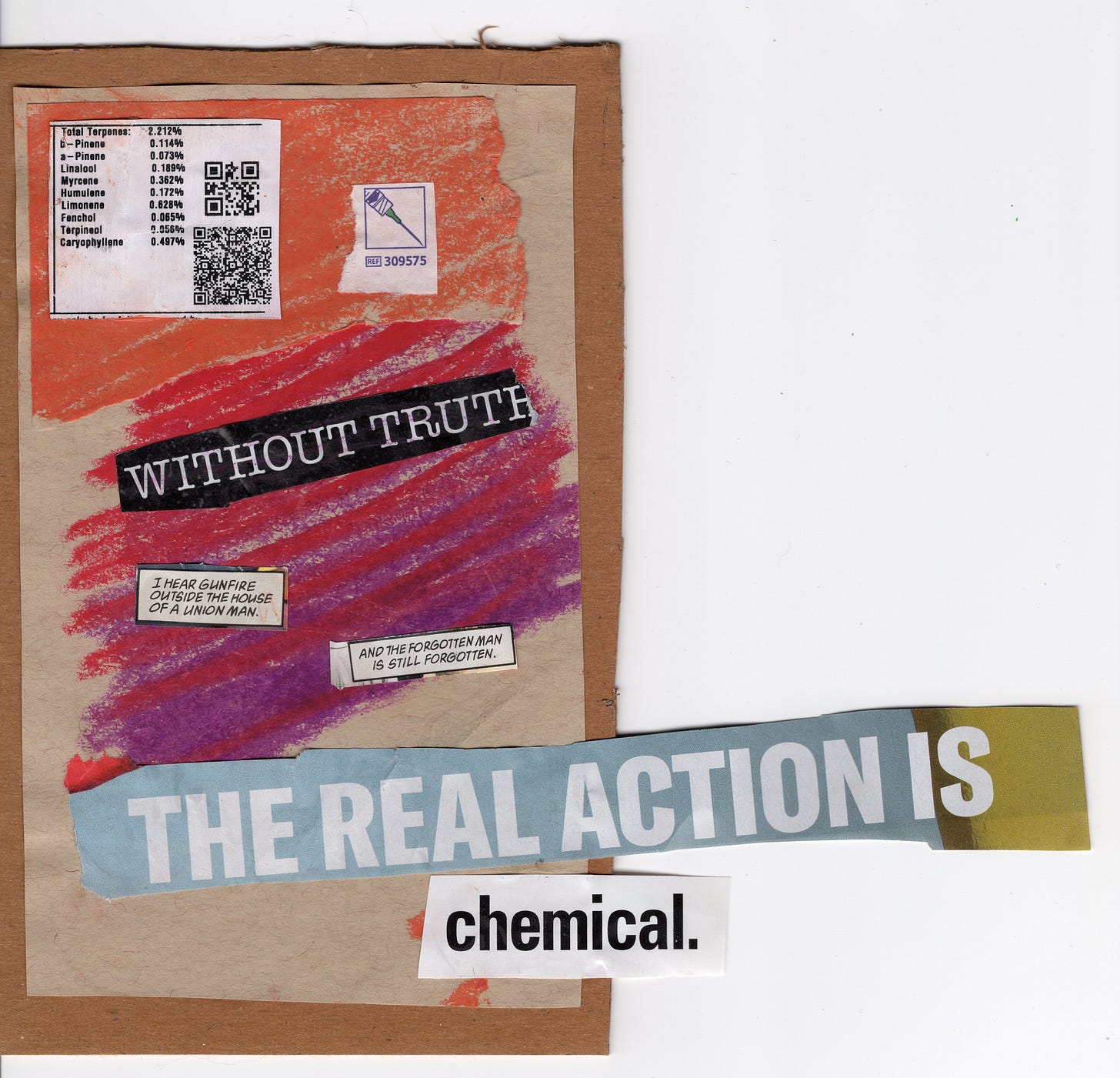RACComputing is making Straight Arrows for the Mothership RPG. Her campaign framework sets up the player crew as “Retrievers,” bounty hunters extracting privileged addicts for treatment by the same pharmaceutical companies which addicted them.

ColumbaryTTRPG: You mentioned that part of what you enjoy about table top writing is how idea-dense the writing is. It sometimes feels like there are whole novels locked up in just a few pages of writing and random tables. What do you enjoy about reading through a streamlined and succinct RPG module or setting as opposed to say a big thick novel?
RACComputing: I used to enjoy reading through those verbose texts and piecing together the world building spread out though multiple books, but I was never 100% satisfied with it. I think more succinct entries allow people more room to fill in the blanks without saying, "well... I like this, but let's do it a little different." You can run into problems with the players of them knowing the cannon better or wanting to play by the book, so to speak and gain saying the person running the game. With putting my own spin on it, based on the blanks left, I can worry about drawing on my own thoughts, often on the fly, as opposed to trying to recall an encyclopedic lore spread across multiple books.
Additionally, part of it is accessibility and my propensity to day dream. I love just sort of drifting off with some of the ideas and my mind tends to wander while I read. This presents a problem with long form prose, but with more short form stuff, it works with the way my mind works, as opposed to against it.
Also, I enjoy the way the table encourage randomness and emergent gameplay, as opposed to a railroaded experience. It allows me to let go and be more player agency centric. It's helped me embrace chaos and being surprised at the table, as opposed to dreading it the way I once did. It's been a revelation and has really helped me unclench my GMing muscles and relax.
ColumbaryTTRPG: Chronic illness and disability are an explicit part of your upcoming adventure module for Mothership Month, Straight Arrows. What influences how you think about addressing these experiences while building a game world?
RACComputing: I absolutely hate the American health care system and the way people get treated like trash if they don't have money. I dialed it up to 11 and focus on injustice, pulling on heart strings, involving PCs who cater to the wealthy elite, but have to deal with the people who aren't as fortunate as a means to an ends, similar to the position many doctors are faced with. Medicaid rounds out the bottom line, but there are additional hoops to jump through and perverse incentives that encourage people to provide for it, without actually maintaining any sort of quality of care. Much of it's illegal, but a law's only as good as its enforcement. I went to one clinic, where I was assigned my PCP and didn't have the wherewithal to jump through hoops choose another. They wouldn't schedule us with the regular patients. We had to line up outside, before they opened and they'd take only a few, first come first serve. These are more clear cut examples, but there are also ones where the doctors really care, but are kind of hamstrung, and everything in-between.
Also, my ex-fiancé, who has a blood disorder and complicating factors used to go to a prosperous hematologist/oncologist where she got about 15 to 20 minutes of care where they would gloss over recent developments, including the more than monthly hospitalizations, and throw opioids at her. She was an easy buck and they treated her like ghetto trash. We'd probably be married if we had a better, institutional support system.
My cousin died of complications of drug addiction. Would he have done better with more financial resources? Do I wish he had someone like the Straight Arrows to force him to recover? I really know, which hurts. Hindsight isn't 20/20.
ColumbaryTTRPG: In a conversation we had before this interview you said “…you can't spend half your waking hours using the money you earn to make up for being miserable earning it…” I think that is something that a lot of people can understand. How do you balance self-fulfilling work with working to survive?
RACComputing: That's good question and I have yet to figure it out. I'm finally finishing up my degree in game design, and get a lot of help from my mom and step dad, live off loans, and recently moved into a cheaper place with my friends to afford my basic expenses. Between that, scholarships, and my part time tutoring gig, I'm able to scrape by and throw my disposable income to some really good artists to help me put together Straight Arrows. Hopefully I establish myself with a bit of a following and can partially support myself with this until I get a job in the video games industry.
I've taken a lot of leaps of faith, and a few, kind loving people have served as my parachutes. I'm more privileged than a lot of people. They understand it takes a lot to maintain my sanity and have seen how miserable I've been doing the normal grind. I will be eternally grateful.

ColumbaryTTRPG: Sometimes it feels hard to justify buying or learning a new set of game rules if you don’t already have an established community to play that game with. I haven’t actually played much mothership, but still enjoy thinking about the worlds that the rules can conjure. What are some of the ways you most enjoy ostensibly social games while doing the inevitably quiet work of brainstorming and writing?
RACComputing: Sometimes the quiet work is my favorite. I used to come up with these bloated campaigns with super fleshed out NPCs that I thought were incredibly compelling. Motivations that would have them acting behind the scenes in parallel to the PCs and reacting to them. I wanted my NPCs to have agency, be very much of the world they inhabited, but ultimately, they took the spotlight off the players characters. It was all too much. These days, instead of over prepping for game or dictating that through modules, I brainstorm on mechanics. I try to make them succinct, but effective and evocative. It's been an interesting challenge brainstorming on this NPC/investigation generator and trying to make it flexible to generate adventures and cases on the fly with out it sprawling or getting too crunchy. I also enjoy trying to build a setting, characters, and what have you as much and as little as possible. Give a sense of something and a lot of useful, actionable information information and cut the chaff. If it's not there it's either not essential or something the warden should personalize. I try to have one interesting idea per sentence. I also homebrew TTRPG and board game stuff, if only in fragments. Neat concepts or trying to figure out how to digest what I'm already familiar with into something new and interesting. I tried to make a card game with poker cards once about nuclear war and proliferation. It was a game where the plurality of outcomes were hypothetically mutual destruction, but there was still an incentive to act because it wasn't assured destruction. I started a Troika hack which with a setting that was a mashup of a LARP actual play reality show and running man. Roleplay to the death. Break character and die.
ColumbaryTTRPG: With your Mothership module Do Not Remove Do Not Transcribe you blend game function, visual aesthetics and storytelling with a collection of tactile diegetic player handouts. I really enjoy thinking about characters in the game universe handling the same props that players also hold and touch. What sorts of real world objects are you referencing as you construct these kinds of player handouts? Is this a purely digital endeavor or does your work also include handcrafts?
RACComputing: I reference autopsies, bank statements, police reports, all sorts of things! I didn't necessarily do a ton of research, but I thought of what the necessary components would be in this fictional setting if it were real. Y'know, form follows function. I also placed a ton of hidden clues. The marriage of diegetic function to in game, mystery building function is something I proud of.
Some the inspirations for the boarding passes were train tickets and those old school, paper metro cards you use to get through the gates. I used to take the metro in and around DC a lot, so they stuck in my mind.
As far as digital vs handicraft goes, I throw it all together. It's all experimental to me and I just throw it at a wall and see what sticks. Sometimes I do physical media and composite it digitally to make sure I don't screw up an entire piece and can reuse the components. Some times I'll do something all digitally, like the logos and put them on something that I'll later print and use as part of a handicraft. Coming back to the boarding passes, I printed those on card stock, weathered them, and scanned them. With one photo, I found a free domain picture, edited it, put some other people's faces on it, and did some processing to make it look more lofi. I made a lot of shitty scans of stuff that I tried to make look realistically mistreated. The photo was printed on glossy paper, curled and scanned in front of a printed, creased letter. I cracked the scanner bed, to make it look extra distorted. I did alll sorts of things to deep fry the documents. If you can't tell what's digital, I've done my job.
You can get RACComputing’s new campaign framework Straight Arrows on BackerKit.
Do Not Remove Do Not Transcribe is available on Itch and at Tuesday Knight Games.
Follow RACComputing at raccomputing.itch.io and on Bluesky
plus learn more about her work at RacComputing.Wordpress.com





